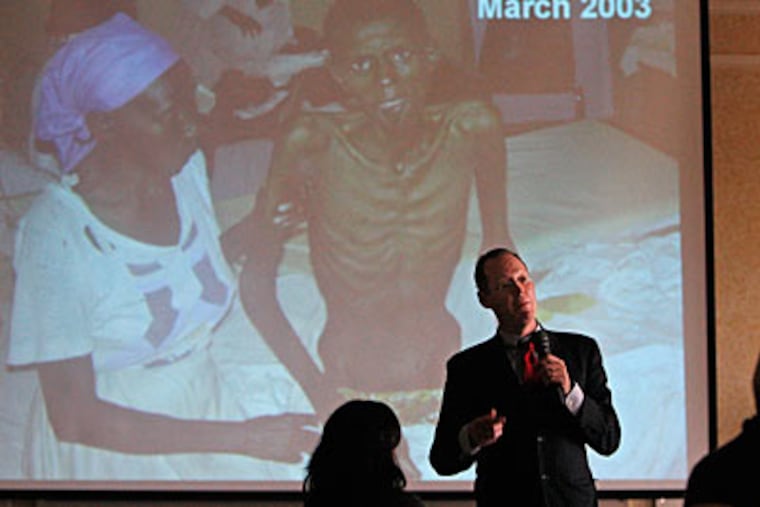Groups seek new ways to spread the health
Paul Farmer and Ophelia Dahl, who head the international nonprofit group Partners in Health, were in the Philadelphia area yesterday to convince local philanthropists that their health-care programs in Haiti and elsewhere are worth the group's investment.

Paul Farmer and Ophelia Dahl, who head the international nonprofit group Partners in Health, were in the Philadelphia area yesterday to convince local philanthropists that their health-care programs in Haiti and elsewhere are worth the group's investment.
Farmer's comprehensive model is based on patients getting the treatment they need, along with visits by community workers and services to address conditions, such as hunger, that feed disease.
The model acknowledges the interaction between poverty and politics, between sickness and social systems. And its founder never utters those all-too-common words "It can't be done."
"You've got to be able to write food on a prescription pad, and we did," Farmer told the members of globalislocal at Gladwyne's Philadelphia Country Club. The fund is innovative in how its members, called partners, give money to social entrepreneurs.
To bolster their case for such an investment, Farmer and Dahl (she's the daughter of the late author Roald Dahl) introduced the audience through words and stories to Joseph Jeune.
Jeune was 26 when a Partners in Health community worker found him in his village, nearly dead from tuberculosis and AIDS. Farmer flashed a slide of Jeune when he was brought to a Partners clinic. The young man was emaciated, his bones pushed out on his skin, and looked nearly dead.
Next, Farmer showed a photo of Jeune six months later, smiling and looking far healthier after being cared for by Partners in Health, which included a worker stopping by his home daily to make sure he took his medications.
"First of all, he comes back from the dead. Then he became a worker," Farmer told the globalislocal audience.
Farmer, a MacArthur genius-grant recipient, is the force behind this interlocking approach to health care in impoverished settings.
His training as an infectious-disease doctor and medical anthropologist framed his initial views of Cange, a village on Haiti's central plateau, where his group still has a medical complex and provides community services.
Farmer's experiences in Haiti and the resulting approach are the subjects of Tracy Kidder's 2003 book Mountains Beyond Mountains.
Now, Partners in Health works in numerous countries, including Peru and Rwanda, as well as in the Boston area, where it is based. Farmer and Dahl's early efforts continue in Haiti.
Dahl recalled being in Cange not long ago, looking at the people they have served there for a quarter-century, and realizing what a splendid return a long-term commitment had brought.
"I saw all these incredibly healthy people," she said.
Globalislocal is a partnership of more than 50 philanthropists, mostly women from the Philadelphia region, that invests in projects tackling extreme poverty in the developing world, said founder and managing partner Elizabeth Wallace Ellers of Haverford. Its target beneficiaries are the estimated millions of people earning less than $4 per day around the world.
She founded globalislocal in 2005. In its first three years, the group raised nearly $400,000 to support projects ranging from Pro Mujer, a microfinance and development project for women in Latin America, to Room to Read, which fosters education by building schools, establishing libraries and creating children's books in local languages, among other activities.
Ellers, a former Wall Street investment banker, has learned that given a structure to find and vet worthy projects (unsolicited proposals are not accepted), individual givers and family foundations are enthusiastic about providing what Ellers calls "philanthropic capital."
"This kind of investing in global social issues is new to many philanthropists," she said. "It's really very helpful to have an organized identifying and vetting process to give philanthropists the security or confidence that they're becoming more knowledgeable and understanding how to be strategic" in making social investments.
Dahl and Farmer answered questions from the group's members that ranged from what they thought of microfinance programs to specifics of what their organization needs.
Answer to the latter: raincoats and boots for the community workers.
Farmer doesn't know yet whether globalislocal will become a supporter of Partners in Health. But his story is a vivid example of what Ellers considers to be the greatest lesson flowing from her own global philanthropic efforts:
"Individuals are essential to creating a more prosperous and secure world."